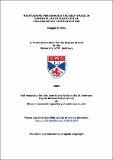Maintaining personhood and self-image in dementia : an exploration of collaborative communication
Abstract
The main aim of this thesis was to explore the maintenance of personhood and
self-image in dementia by way of facilitating collaborative communication between
people with dementia and their caregivers/interaction partners. As such, the roles of
the person with dementia and the interaction partner were examined in each study
within the realms of the ‘Collaborative Personhood Model’.
Findings of the first study highlighted strategies used by people with mild to
severe dementia to maintain social interactions, to save-face and to maintain and
project a sense of self-image in a reminiscence situation. The impact of introducing a
family member as the interaction partner in a similar reminiscence-based situation
using personal photographs was then explored. The findings of this study indicated
that the personal nature of the photographs can create conflict between the person with
dementia and her family member. Crucially, these studies illuminated the supportive
role that the communication partner must adopt in order to successfully facilitate
people with dementia to maximise their retained communication skills.
Communication and sense of self was then examined in an individual with very severe
dementia with some retained speech. The findings of this study illuminated the
potential of imitation in communicating with people at this stage of the illness. These
findings were then built upon by exploring the use of Intensive Interaction (II) in a
person with very advanced dementia with no retained speech. Findings of this study
indicated retained awareness of self and functional communication skills at very late
stages of dementia. Finally, this study was expanded using a modified version of II
(Adaptive Interaction) in a small group of individuals with very severe dementia with
very little or no retained speech. These findings indicated an unprecedented desire and
ability to communicate in people with such severe dementia.
Taken as a whole, these studies highlighted the adaptive and collaborative role
that the interaction partner must adopt in order to facilitate the maintenance of
personhood and self-image in people with dementia. More specifically, the interaction
partner must adjust to the communicative repertoire that is maintained at each stage of
dementia and in each individual. The ‘Collaborative Personhood Model’ represents an
attempt to explain how this might be achieved.
Type
Thesis, PhD Doctor of Philosophy
Collections
Items in the St Andrews Research Repository are protected by copyright, with all rights reserved, unless otherwise indicated.

